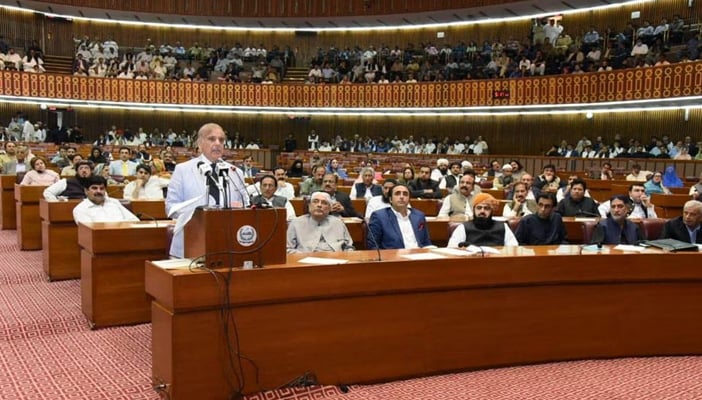[ad_1]
After the 15th National Assembly was dissolved with President Arif Alvi’s approval of the summary sent by Prime Minister Shehbaz Sharif, all eyes are on the appointment of an interim head of the government to officiate the caretaker setup.
The appointment of a caretaker premier, which is the next step after assembly dissolution, will be done under Article 224A of the Constitution.
For this, PM Shehbaz and Leader of the Opposition in the National Assembly Raja Riaz Ahmed will hold a consultation for deciding on a name for the coveted post of interim premier.
The consultation will officially commence today (Thursday).
It may be noted that there is a three-day deadline for the appointment of a caretaker after the assembly is dissolved.
In case a name is not agreed on in this period, the matter is forwarded to the parliamentary committee. Under the law, the premier and the opposition leader will send their respective names for the coveted post to the parliamentary committee.
The parliamentary committee then has to decide on a name for the caretaker prime minister’s post in the next three days.
However, if the committee also fails to reach a decision, the matter is taken to the Election Commission of Pakistan (ECP), which is bound to finalise a name within the next two days.
Moreover, the electoral body is also responsible for announcing a date for the elections under Article 224-1 after the assembly dissolution and officially notifying the election results within 14 days after whenever the polls are successfully conducted, as per the Constitution.
However, the decision on when the polls will be held is subject to the fresh delimitation of the constituencies.
It may be noted that if the government dissolves prematurely, the Election Commission of Pakistan (ECP) is bound to hold the general elections within 90 days, instead of 60 if the legislature completes its constitutional term on August 12.
However, after the Council of Common Interest (CCI) approved of the census 2023, the ECP is bound to carry out new delimitations, which might take months.
On Monday, Interior Minister Rana Sanaullah said that the general elections might be delayed until March next year.
[ad_2]

